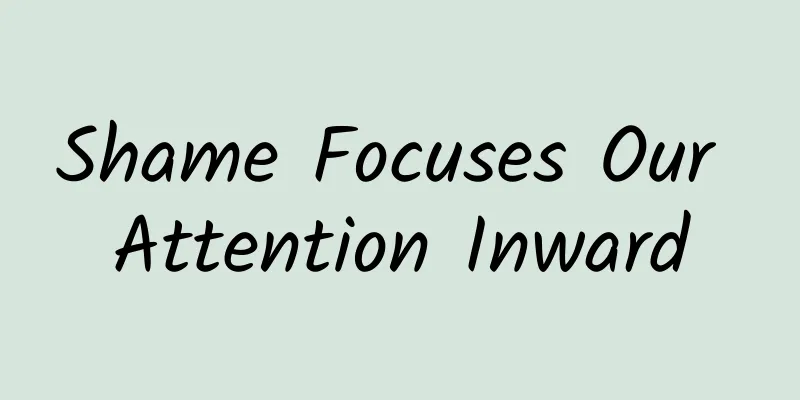Shame Focuses Our Attention Inward

|
Leviathan Press: Confucius once said, "Govern the people with proper laws and punishments, and they will avoid punishment but have no sense of shame. Govern the people with moral principles and rites, and they will have a sense of shame and be upright." Shame - the restraint that comes from within - is acquired by humans based on different social and cultural customs and norms. It's just that the sense of shame varies from person to person and from culture to culture. For people in primitive tribes, being naked in public is not something they would feel ashamed of. Of course, both "shame culture" and "guilt culture" are products of social indoctrination and are of great significance to the maintenance of ethnic groups and even the country. However, because it is an external standard of judgment (being praised by others is a pride, and being rejected by everyone is a shame), the psychological reaction of shame does not seem to be relieved by simple confession. When we violate the social norms we believe in, we will not only feel shame, humiliation, social death and shame, but also be unable to look others in the eye. We wish we could immediately crawl into the cracks in the ground and disappear without a trace. Shame focuses our attention inward and makes us see ourselves in a negative light. Guilt, on the other hand, comes with specific actions we are responsible for, and makes us more concerned about the feelings of others. Women feel shame sooner than men, and adolescents feel it more strongly than adults. As a result, women and adolescents are more vulnerable to the negative consequences, low self-esteem and depression. We have all been ashamed. Maybe we were teased for mispronouncing a common word, or made fun of for wearing an inappropriate bathing suit, or a loved one caught us lying. Shame turns our hearts upside down when we lose our safe haven under the judgmental gaze of others. We feel small and terrible and wish we could disappear. Despite its prevalence, shame's impact on people's mental health and behavior is less intuitive, and researchers are making good progress. © Eduardo Rubio/Wellcome Collection Harmful to health Philosopher Hilge Landweer of the Free University of Berlin argues that people feel shame only when certain conditions are met. First, the person must be aware that they have violated a social norm. Second, the norm must be desirable and binding, so that the person who violates it feels uncomfortable. Simply thinking about others commenting on him or her (without them being present) can make him or her feel ashamed. Some people often have this picture in their minds: Dad or Mom is questioning them, "Are you okay?" In fact, we may internalize this admonition so completely that the norms and expectations imposed by our parents in childhood still affect us as adults. June Tangney of George Mason University has studied shame for decades. In collaboration with Ronda L. Dearing of the University of Houston and other researchers, she has found that people with shame-proneness also tend to have low self-esteem (which means that a certain level of self-esteem may protect us from excessive shame). Researchers such as Tanney and Dilling have found that shame-proneness can also increase people's risk of developing other mental illnesses. In a large-scale psychological analysis project, researchers conducted 108 studies and surveyed more than 22,000 subjects. The results showed that shame-proneness is clearly linked to depression. (www.routledge.com/Shame-and-Guilt/Tangney-Dearing/p/book/9781572309876) (www.ncbi.nlm.nih.gov/pmc/articles/PMC3106346/) In a 2009 study, Sera De Rubeis, then at the University of Toronto, and Tom Hollenstein of Queen's University in Ontario specifically studied the impact of shame tendency on adolescent depression. Their study subjects included about 140 subjects aged between 11 and 16 years old, and the results showed that the stronger the shame tendency, the more likely the adolescents were to suffer from depression. In 2010, Thomas A. Fergus of Baylor University and his colleagues showed that shame tendency also seems to make people suffer from anxiety disorders such as social phobia and generalized anxiety disorder. (www.sciencedirect.com/science/article/abs/pii/S0191886908004455) Gender and age differences In 2010, a team of psychologists led by Ulrich Orth of the University of Bern studied shame in more than 2,600 volunteers aged 13 to 89 (most of whom lived in the United States). They found that in addition to gender, age also seems to affect the intensity of shame: adolescents are most likely to feel shame; for middle-aged people, shame gradually decreases with age until about age 50, and then increases again in old age. (pubmed.ncbi.nlm.nih.gov/21114354/) The researchers believe that this pattern of change is related to personality development. Adolescents and young adults have not yet completed their identity construction; in addition, they are expected to conform to various norms that define their social status. Uncertain about how to deal with these externally imposed expectations, they may be more prone to shame. In contrast, middle-aged people have more or less formed personalities and are less influenced by norms. But as we enter old age, our self-consciousness will increase again due to concerns about physical decline and loss of appearance. © Journey Of Young Women Guilt and Shame: Related but Not the Same It is speculated that the reason why humans have shame is that it confers some evolutionary advantage on our ancestors. For example, shame can encourage people to abide by social norms and win the favor of others, thereby subtly seeking the welfare of the entire group. But Taney and others believe that shame reduces people's tendency to act according to socially constructed patterns, while shame's cousin, guilt, encourages people to adapt to society. People often confuse the two, but they are not the same. Guilt, like shame, arises when we violate moral, ethical, or religious norms and feel guilty about it. The difference is that when we feel shame, we view ourselves in a negative light (I did something terrible!), whereas when we feel guilt, we view our behavior in a negative light (I did something terrible!). We feel guilty because our behavior affects others and we feel responsible. © Scientific American As Tanney and his co-authors explained in a 2005 paper: “A shame-prone person who is reprimanded for being late to work after a night of heavy drinking may think, ‘What a failure I am. I just can’t pull myself together.’ Whereas a guilt-prone person is more likely to think, ‘It’s bad to be late. I’m causing trouble for my coworkers.’ Shame can be painful and debilitating, affecting one’s core sense of self and even trapping people in a cycle of negative affect… In contrast, guilt, while painful, is less likely to be disabling and may even motivate individuals to make amends or change in positive ways.” (www.ncbi.nlm.nih.gov/pmc/articles/PMC3106346/) In addition, guilt is a sign of empathy, a trait that is important for perspective-taking, altruistic behavior, and building close relationships. In fact, we only feel guilt when we put ourselves in the shoes of others and realize that our actions have caused them pain or harm. People who cannot empathize, generally speaking, children, do not feel guilt. Guilt not only prevents us from harming others, but also encourages us to build connections for the common good. When we feel guilt, we look outward, seeking strategies to repair the damage. When we feel shame, we turn our attention inward, focusing on the emotions churning inside and paying less attention to what’s happening around us. A 2015 study explicitly linked guilt to empathy. Matt Treeby, then at La Trobe University in Melbourne, and his colleagues first asked test subjects to determine their propensity to shame and guilt. They then asked 363 participants to observe other people's facial expressions and judge whether the person was angry, sad, happy, scared, disgusted or ashamed. It turned out that people who were prone to guilt were more accurate: they were better at identifying other people's emotions than those who were prone to shame. (pubmed.ncbi.nlm.nih.gov/26264817/) Of course, to some extent, guilt and shame often go hand in hand. Guilt often leads to shame for many people because actual behavior does not match the standards we follow. The stronger the intention to commit the misconduct and the more and more important the people present, the stronger the link between guilt and shame. Shame also grows if the people we have hurt reject or blame us. The original sin that cannot be escaped In the Bible, nakedness is the source of shame. Genesis 2:25 mentions Adam and Eve: "They were both naked, and they felt no shame." This changed when they disobeyed God's command and ate the forbidden fruit. From then on, they could not help but feel shame when they saw each other: "The eyes of both of them were opened, and they knew that they were naked; so they sewed fig leaves together and made coverings for themselves." The Bible’s explanation of the shamefulness of nudity still profoundly influences social norms and customs that shape how people treat their bodies and sexuality. Although our ideas about whether, how, where, and in front of whom we can be naked have changed dramatically over the centuries, we still feel shame when we break those norms. It is often easier to get rid of guilt than shame, in part because human society provides many ways to atone for sins, such as apologizing, paying fines, and serving a prison sentence. Religious rituals such as confession can also help people feel less guilty. Shame is more stubborn because it is easier to apologize for a mistake than to accept it. Some guilt can be just as destructive as shame, such as “disembodied” guilt (not tied to a specific event) and guilt that comes from powerlessness. But overall, shame tends to be more destructive. So if parents, teachers, judges, and others want to encourage others to behave constructively, it is best not to shame them for breaking the rules but to help them realize that their behavior affects others and that they must take steps to make amends. By Annette Kämmerer Translation/antusen Proofreading/boomchacha Original article/www.scientificamerican.com/article/the-scientific-underpinnings-and-impacts-of-shame/ This article is based on the Creative Commons License (BY-NC) and is published by antusen on Leviathan The article only reflects the author's views and does not necessarily represent the position of Leviathan |
>>: Another kind of "shit" produced by the human body, you and I swallow 2 bottles every day!
Recommend
What causes brown blood during menstruation?
During the menstrual period, if female friends fi...
Effectively prevent falls and become a "tumbler" with a smile! Please keep this "Fall Prevention Guide"!
Falling may seem like a trivial matter, but in se...
The harm of crying during pregnancy
In the late stages of pregnancy, pregnant women&#...
You think you are good for your kidneys, but these three things actually hurt them! Please keep these tips that are really good for your kidneys
Kidney health is vital, but many people go astray...
Can pregnancy cause ovarian cysts?
There are many causes of ovarian cysts, a small p...
What is the difference between mammography and breast ultrasound?
Breast diseases have now become a common and freq...
High blood pressure: the art of dancing with "high pressure"
In the fast-paced modern life, there is a disease...
Why are more and more people allergic to pollen?
1024, 1186, 1720, 1466, 2386, 1362... These figur...
What to do if you have dysmenorrhea after giving birth
Dysmenorrhea is a painful torture for many women....
What is the normal heart rate in early pregnancy? What should you pay attention to during pregnancy?
Pregnancy is a very important moment for every wo...
Women here are hairless and must be defeated
Both men and women are born with body hair, wheth...
Tofu contains high levels of estrogen. Will men who eat too much become effeminate and women who eat too much get cancer? The truth is out.
Tofu contains high levels of estrogen. Will men w...
Five reasons for anemia and eight kinds of food to nourish blood and beautify the skin
Fatigue, sleepiness, and weakness are the most co...
Diet table for the first week of normal delivery
After a normal birth, a woman's body is very ...
A comprehensive guide to anti-wrinkle foods for women in their 30s
In today's era, fruits, vegetables and variou...









